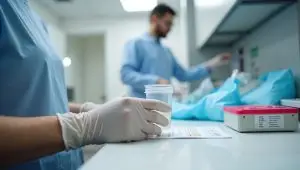When it comes to securing a job, the hurdles extend beyond acing interviews and negotiating salaries. For many positions, especially within specific industries, health screenings play a pivotal role in the hiring process. These screenings ensure that candidates meet the necessary health standards to perform their job safely and effectively. But what exactly does this entail?
Whether you're a business owner, an HR professional, a recruiter, or a job seeker in industries such as staffing agencies, healthcare, transportation, or technology, understanding health screenings is essential. This comprehensive guide will walk you through what a health screening for a job involves, various tests associated with it, legal considerations, and insights into drug testing.
Key Takeaways
- Health screenings are an essential part of the hiring process across various industries, ensuring candidates can safely perform job duties.
- These screenings typically include physical exams, vision and hearing tests, and drug and alcohol testing to assess candidates' physical and mental fitness.
- Understanding and preparing for drug tests, which check for substances like marijuana and alcohol, can help job seekers face the screening confidently.
- Employers must follow legal guidelines to ensure that screenings are non-discriminatory and respect candidates' privacy and confidentiality.
- Clear communication between employers and candidates about the screening process is crucial in fostering trust and ensuring a smooth and fair hiring experience.
Introduction
In today's job market, landing a position is not just about your resume or interview chops. Health screenings are becoming a crucial part of hiring, with more sectors recognizing their importance. Whether you're eyeing a job in healthcare, transportation, or even tech, you might encounter this step.
Simply put, health screenings are checks employers use to confirm that candidates can perform their jobs without risking their own safety or that of others. They can include anything from a basic physical to more specific tests tailored to job requirements.
This guide aims to break down the health screening process, offering practical insights to employers and demystifying it for job seekers. Stick around to understand how these screenings fit into the broader hiring picture.

What is a Health Screening for a Job?
Health screenings for jobs are more than just routine check-ups; they're a series of medical assessments tailored to determine if a candidate is fit for a specific role. These screenings can include anything from a basic physical examination to more specialized tests, depending on the job's demands.
The main purpose of health screenings is straightforward: ensure the safety and well-being of employees and those around them. Employers seek to reduce workplace accidents and enhance overall productivity by confirming that candidates are in good health to handle the physical and mental demands of the job. This approach is especially crucial in industries where health and safety standards are non-negotiable.
Health screenings are commonly required in industries such as healthcare, where patient safety is paramount, transportation, where the ability to operate vehicles safely is critical, or tech fields, where mental acuity and focus are essential. In each case, the screening process is tailored to the specific risks and requirements of the job. Thus, understanding these screenings is key for both employers aiming to maintain a safe workplace and job seekers preparing to meet these hurdles head-on.
Components of a Health Screening
When it comes to health screenings for jobs, there are a few core components that most processes will cover. These tests are designed to ensure that candidates are physically and mentally fit to perform their job duties without risking their own safety or that of others.
General Physical Exam: Think of this as your typical doctorâs check-up, only it's tied to a job offer. The physical exam usually includes a review of your medical history, a check on your vital signs like blood pressure, heart rate, and temperature, and an overall assessment of your physical health. The aim is to spot any conditions that might affect your ability to work efficiently or safely.
Vision and Hearing Tests: These are crucial, especially if you're looking at roles where sensory perception is key. Whether it's reading a computer screen all day or operating machinery, good eyesight and hearing are non-negotiable. These tests identify potential issues that could be corrected or managed to keep the workplace safe.
Drug and Alcohol Testing: Substance abuse can present significant risks in the workplace. Thatâs where drug and alcohol tests come into play. Depending on the job, you might face urine, blood, or breath tests to check for illegal drugs or alcohol. The idea is to ensure that employees are in a good state of mind and body, reducing accidents and increasing efficiency. These tests typically look for substances like marijuana, cocaine, opiates, and alcohol, among others.
These core components collectively offer a snapshot of a candidateâs health and readiness for the workplace theyâre aiming to join. As a job seeker, knowing what to expect can help you prepare for these screenings better, while employers can rest assured they're creating safer environments by incorporating these assessments into their hiring processes.
Understanding Drug Tests in Health Screenings
Drug testing is a critical component of many health screenings, ensuring that potential employees adhere to workplace safety standards. Let's break down the different types of drug tests you might encounter.
Non CDL DOT Physical Drug Test
For non-commercial drivers, the Non CDL DOT physical drug test is a key screening tool. It's less stringent than those for commercial drivers but still screens for essential substances. It typically involves a urine test that checks for drugs that might impair the ability to perform safe driving, even if the job doesn't require a commercial license.
Urine Drug Test
The urine drug test is the workhorse of pre-employment screenings. It's straightforward: you provide a urine sample, and labs analyze it for substances like marijuana, cocaine, opiates, and more. This test is reliable, relatively low-cost, and can detect drug use within the past few days to a week. Costs for a urine drug test can vary but typically range around $30 to $60 depending on the extent of the analysis.
Mouth Swab Test
Mouth swab (or saliva) tests offer a non-invasive alternative to urine tests. It's quickâresults come back in a matter of days. If you're wondering, âhow long does it take to pass a mouth swab?â the detection window is short, from 24 to 48 hours for most substances.
THC and Other Substances
There's often curiosity around THCâcan something like THC lotion affect drug test results? The short answer: lotions donât usually impact standard drug screenings as they primarily test for inhaled or ingested THC forms.
Alcohol Testing in Pre-Employment Screens
While not always included, alcohol testing can be part of the pre-employment screening. Blood and breath tests are common methods used to check for current alcohol levels, ensuring candidates aren't impaired at work's onset.
By understanding these tests, job seekers can approach screenings with confidence, while employers can ensure a safe, compliant hiring process.
Legal Considerations and Best Practices
Navigating the legalities of health screenings in the employment process can be a tightrope walk. There are laws and guidelines to ensure fairness and protect both employers and job seekers. Here's what you need to know:
Legal Framework
Before implementing any health screening, understanding the legal boundaries is crucial. In the U.S., the Department of Labor (DoL) provides a framework to ensure screenings are compliant with laws like the Americans with Disabilities Act (ADA) and the Health Insurance Portability and Accountability Act (HIPAA). These laws dictate what is permissible in health screenings, ensuring that tests are job-related and consistent with business necessity.
Non-Discrimination
Non-discrimination is the cornerstone of ethical hiring practices. Employers must ensure that health screenings do not unfairly exclude certain candidates. For instance, accommodations should be considered for individuals with disabilities, ensuring that screenings are equitable and reflective of the actual demands of the job, not based on generalized assumptions.
Confidentiality
Handling health-related information comes with a heavy responsibility to maintain confidentiality. Employers are legally bound to protect the medical information of their employees. This means securely storing any health data and restricting access to only those who absolutely need it for decision-making purposes. Violating confidentiality can lead to significant legal repercussions, not to mention eroding trust with potential employees.
Actions After Failing a Drug Test
Failing a drug test doesn't always slam the door shut on employment. Employers should have clear policies outlining the steps to take when a candidate doesn't pass a drug screening. This could include confirming the result with a secondary test, offering a chance for the candidate to explain or contest the findings, or providing a grace period for reevaluation. These steps not only ensure fairness but also reflect a commitment to transparency and due process.
Balancing these legal and ethical considerations is key to conducting health screenings that are fair, respectful, and compliant with the law. Employers are encouraged to seek legal counsel when in doubt to navigate these nuances effectively.
Preparing for a Health Screening
Pre-Screening Tips for Job Seekers
Facing a health screening for a job? Hereâs how to ease into it. First off, know what you're up against. Familiarize yourself with the tests included and understand what they'll measure. No need for surprises.
Next, if you've got plenty of notice, start making some simple lifestyle tweaks. Eat a balanced diet, stay hydrated, and get enough rest. These adjustments might help stabilize key health indicators like blood pressure and blood sugar levels.
If you're a smoker or big coffee fan, try to limit these just before the screening; they can affect certain test results. If there's drug testing involved, stay away from substances that might show up in the results.
Itâs always a good idea to gather any medications or health conditions you have and provide them to the testing facility if asked. Transparency goes a long way.
Advice for Employers
Employers, clarity is king when it comes to health screenings. Set concise and precise guidelines for what your screening entails and communicate this to candidates from the get-go. No one likes being left in the dark, and itâll help set expectations right.
Consider working closely with your screening provider to establish a straightforward process that respects both legal requirements and candidate privacy. You want to ensure that screenings are relevant to the job functions, not just a tick-box exercise.
Finally, ensure compliance with non-discrimination policies during screenings. Each candidate should be treated with the same standards to maintain fairness across the board. A transparent, respectful approach minimizes misunderstandings and upholds your companyâs integrity.
Conclusion
Health screenings have become a staple in the modern hiring process, acting as a gatekeeper for safely integrating new employees into various work environments. We've seen how these screenings tackle everything from vision and hearing checks to more complex drug and alcohol testing. They help ensure that candidates are prepared to meet the physical and mental demands of their jobs, minimizing risks and enhancing workplace safety.
For employers, the challenge is to establish clear, consistent, and fair health screening policies that align with legal standards and protect candidate privacy. Crafting transparent procedures not only builds trust but also streamlines the hiring process, reducing ambiguity for both parties.
Job seekers, on the other hand, can approach these screenings with confidence by understanding whatâs expected and preparing adequately. Being informed about potential components like drug tests can ease anxiety and facilitate smoother navigation through the hiring process.
Ultimately, health screenings serve to benefit both employers and employeesâensuring safety, enhancing performance, and solidifying the foundation of a successful employment relationship. As you move forward, carry these insights with you, whether you're drafting screening policies or standing on the brink of a new career.
Additional Resources
- Understanding the Different Types of Background Checks
- What is a Health Screening for a Job? Everything You Need to Know
- What is a Health Screening for a Job? A Complete Guide
- Pre-Employment Physicals: A Comprehensive Guide for Employers and Job Seekers
- Do Employment Drug Tests Include Alcohol? What You Need to Know

GCheck Editorial Team
Meet the GCheck Editorial Team, your trusted source for insightful and up-to-date information in the world of employment background checks. Committed to delivering the latest trends, best practices, and industry insights, our team is dedicated to keeping you informed.
With a passion for ensuring accuracy, compliance, and efficiency in background screening, we are your go-to experts in the field. Stay tuned for our comprehensive articles, guides, and analysis, designed to empower businesses and individuals with the knowledge they need to make informed decisions.
At GCheck, we're here to guide you through the complexities of background checks, every step of the way.





